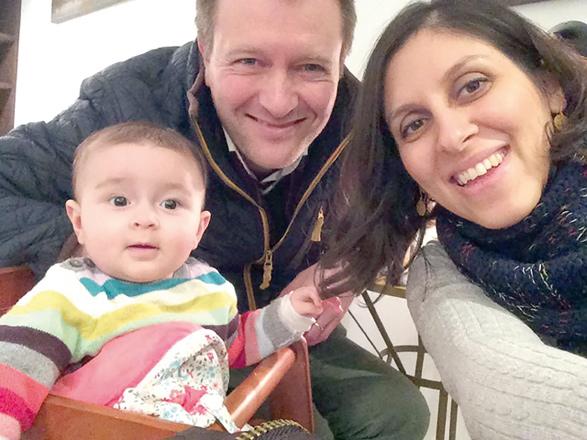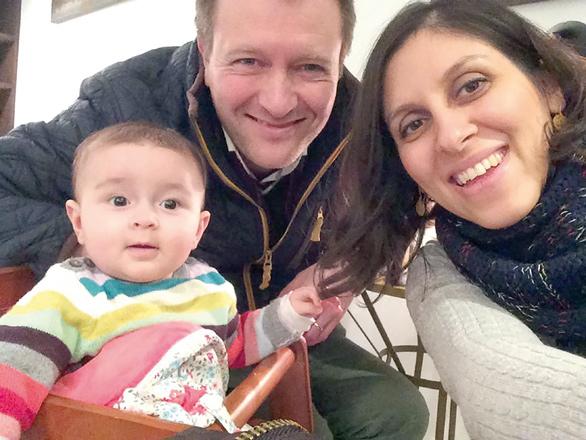You are here
Zaghari-Ratcliffe back in Iran court on ‘propaganda’ charges
By AFP - Mar 15,2021 - Last updated at Mar 15,2021

This undated file handout image released by the Free Nazanin campaign in London on June 10, 2016, shows Nazanin Zaghari-Ratcliffe posing for a photo with her husband Richard and daughter Gabriella (left) (AFP photo)
TEHRAN — British-Iranian dual national Nazanin Zaghari-Ratcliffe appeared in a Tehran court on Sunday to face new charges of “propaganda against the system”, a week after she finished serving a five-year sentence, her lawyer said.
The hearing has dashed the hopes of family and supporters for a swift release of the 42-year-old, in a case that has heightened diplomatic tensions between London and Tehran.
British Foreign Secretary Dominic Raab said it was “unacceptable that Iran has chosen to continue a second wholly arbitrary case”.
According to Zaghari-Ratcliffe’s lawyer, Hojjat Kermani, she is now being prosecuted for “propaganda against the system for having participated in a rally in front of the Iranian embassy in London” in 2009.
Zaghari-Ratcliffe spoke in court where she denied all charges, according to the Free Nazanin support campaign.
“Nazanin... pointed out that all the accusations and evidence put forward had been part of her trial in 2016,” the group said.
“She had already been tried and convicted on this evidence.”
Kermani told AFP that “the hearing took place in a very calm and good atmosphere, in the presence of my client”.
‘Detention effectively open-ended’
Under Iranian law, the court has seven working days to issue a judgement, although delays are common.
With the Islamic republic about to celebrate the Iranian new year, it means a ruling might not be released until March 30.
Britain demanded the mother-of-one be allowed to fly home immediately.
“She must be allowed to return to her family in the UK without delay,” Raab said. “We continue to do all we can to support her.”
Kermani said that “given the evidence presented by the defence and the legal process, and the fact that my client has also served her previous sentence, I hope that she will be acquitted”.
But the support committee is less optimistic. “At present, Nazanin’s future remains uncertain, and her detention effectively open-ended,” it said.
Zaghari-Ratcliffe was detained while on holiday in 2016 and convicted of plotting to overthrow the regime in Tehran — accusations she strenuously denied.
She was working at the time as a project manager for the Thomson Reuters Foundation, the media organisation’s philanthropic wing.
She has been under house arrest in recent months and had her ankle tag removed, giving her more freedom of movement and allowing her to visit relatives in Tehran.
She completed her sentence on March 7.
In a statement on Sunday, Thomson Reuters Foundation CEO, Antonio Zappulla, said Zaghari-Ratcliffe’s “five-year trauma should have come to an end last week” and that she “is an innocent victim of a political dispute”.
“This latest trial and delayed outcome is a deliberate move to prolong her ordeal and her suffering.”
Harsh conditions
On March 8, her husband Richard Ratcliffe and their six-year-old daughter Gabriella held a vigil outside the Iranian embassy in central London, demanding she be allowed home.
He tried to deliver an Amnesty International petition signed by 160,000 supporters calling for his wife’s release, but was turned away.
Earlier this month, Ratcliffe told the BBC his wife’s detention has “the potential to drag on and on”.
Ratcliffe and media in both the UK and Iran have drawn a possible link between Zaghari-Ratcliffe’s detention and a British debt dating back more than 40 years for military tanks paid for by the shah.
When the shah was ousted in 1979, Britain refused to deliver the tanks to the new Islamic Republic and London has admitted it owes Iran several hundred million pounds.
However, both countries have denied any link with the Zaghari-Ratcliffe case.
She has been temporarily released from Tehran’s Evin prison and has been under house arrest since last spring due to the coronavirus outbreak.
For four years, however, at Evin she spent time in solitary confinement in windowless cells, declared hunger strikes and had medical treatment withheld.
While in prison, she suffered from a lack of hygiene and even contemplated suicide, according to her husband.
Iranian authorities have consistently denied that Zaghari-Ratcliffe was mistreated.
On Friday, campaign group Redress handed a report to Raab, which it said “confirms the severity of the ill-treatment that Nazanin has suffered”.
The legal campaigners said it “considers that Iran’s treatment of Nazanin constitutes torture”.
Related Articles
LONDON — The release of Nazanin Zaghari-Ratcliffe, a UK-Iraninan dual national held in Tehran, could be in doubt, her husband told the BBC o
LONDON — Iran on Monday adjourned a new trial of British-Iranian woman Nazanin Zaghari-Ratcliffe, according to her husband and the UK govern
LONDON — Tehran on Sunday abruptly postponed a new trial of British-Iranian woman Nazanin Zaghari-Ratcliffe, according to her husband, who a

















